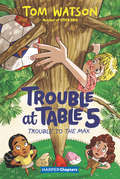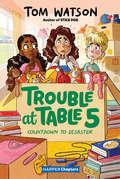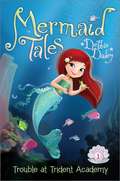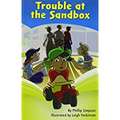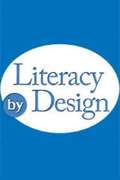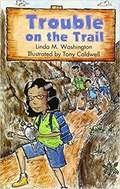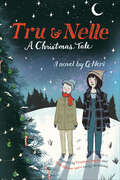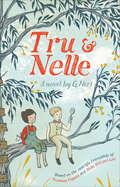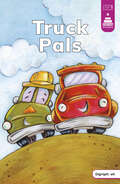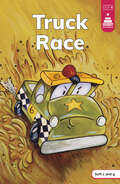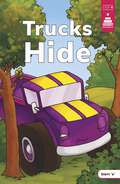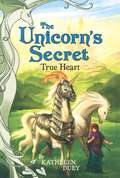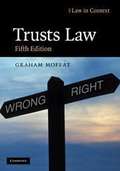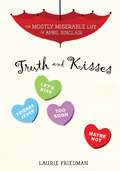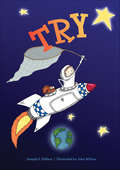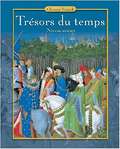- Table View
- List View
Trouble at Table 5 #5: Trouble to the Max (HarperChapters)
by Tom WatsonFrom the author of Stick Dog comes the fifth book in a highly illustrated early chapter book series about three best friends whose plans, missions, and schemes are sure to shake up their school. Time out! Simon got Max Brutus’s prized World Cup soccer ball stuck in the tallest tree in Picasso Park! Now he’s in more trouble than a tater tot in ketchup. Can his friends at Table 5 help him get the ball before the big game? Or has Simon’s luck maxed out? HarperChapters build confident readers one chapter at a time! With short, fast-paced books, art on every page, and milestone markers at the end of every chapter, they're the perfect next step for fans of I Can Read!
Trouble at Table 5 #6: Countdown to Disaster (HarperChapters)
by Tom WatsonFrom the author of Stick Dog comes the sixth book in a highly illustrated early chapter book series about three best friends whose plans, missions, and schemes are sure to shake up their school. Uh-oh! Molly’s parents have a secret. They want to move to a new house—maybe even a new town. But Molly can’t leave her best friends Rosie and Simon behind!Now the trio from Table 5 only have three days to come up with a scavenger hunt that will remind Molly’s parents of all the things they love about their house and neighborhood…before the moving vans come and Molly has to go. HarperChapters build confident readers one chapter at a time! With short, fast-paced books, art on every page, and milestone markers at the end of every chapter, they're the perfect next step for fans of I Can Read!
Trouble at Trident Academy
by Debbie Dadey Tatevik AvakyanIn this start to a new series starring Shelly the mermaid, a classroom conflict is no fun--even when school is 20,000 leagues under the sea.It's MerGirl Shelly Siren's first day at a new school, and she is nervous from the tip of her head to the end of her sparkling mermaid tail. How will she ever fit in at the prestigious Trident Academy? Everyone there is so smart and so pretty and so rich. At least she and her best friend, Echo, are in the same class, but so is Pearl, a spoiled know-it-all who only wants to make trouble for Shelly; Rocky, a MerBoy who loves to tease everyone; and Kiki, a shy MerGirl who's new to Trident City. At first Shelly and Echo have lots of fun: eating lunch together, trying to make grumpy Mr. Fangtooth smile, and joining after-school clubs. But when Shelly and Echo have an argument about their very first school assignment, Pearl gets involved and makes matters worse. Will Shelly and Echo fix their friendship?
Trouble on the Trail (Fountas & Pinnell Classroom, Guided Reading Grade 4)
by Marcos Calo Lisa LernerTRICKY TRAILS Mason can't wait to go hiking in Lost Caverns. Then he gets paired with Hannah, who's definitely not one of his favorite people. But it's not long before Mason discovers that Hannah is the least of his problems. NIMAC-sourced textbook
Trouble on the Trail (Into Reading, Level N #78)
by Linda Washington Tony CaldwellNIMAC-sourced textbook
Troubleshooting Electric Motors (Fourth Edition)
by Thomas E. Proctor Glenn A. MazurTroubleshooting Electric Motors is a text/workbook that includes information and procedures for troubleshooting motors and motor circuits commonly used in industrial applications. It includes all aspects of troubleshooting, from locating the problem using test instruments to selecting the correct motor for replacement. Each chapter concludes with activities and trade tests to help reinforce troubleshooting concepts. This edition includes an introduction to test instruments, AC and DC generators, and servo-motors. Information on energy-efficient motors and safety has been expanded.
Trozos y piezas: Razones, números racionales y equivalencia
by Glenda Lappan James T. Fey Susan N. Friel Elizabeth Difanis PhillipsNIMAC-sourced textbook
Tru & Nelle: A Christmas Holiday Book For Kids
by G. Neri&“This sequel [to Tru & Nelle] stands on its own. The writing is gorgeous—not one false stroke. Neri's uneasy peer into a piece of Americana squeezes dribs of hope from precious blood. Totally brilliant. Bravo!&” —Rita Williams-Garcia, 3-time Coretta Scott King Award-Winner and Newbery honoree for One Crazy Summer ? "An absorbing story of true friends in troubled times." —Kirkus, starred review "As in Neri&’s first book about the real-life Truman Capote and Harper Lee, middle grade readers will laugh, cry, and be surprised by the many unlikely situations these preteens seem to find for themselves and their families." –School Library Journal —
Tru & Nelle: A Christmas Holiday Book For Kids (Tru And Nelle Ser.)
by G. Neri* &“In a bold but rewarding gambit, Neri imagines the childhood friendship of Harper Lee and Truman Capote, sprinkling in bits of To Kill a Mockingbird and foreshadowing such adult events as their collaborative work on In Cold Blood—yet still making it entirely Neri&’s own…. The children&’s symbiotic relationship holds center stage. Neri doesn&’t shy away from their attributes: Nelle can be a bully and Tru is seen as a &“sissy.&” But their ability to play to each other&’s strengths compensate for any real or perceived weaknesses as they rope others into their fantastic plans. As Neri puts it, &‘They made for a perfect pair of misfits. . . . And that was okay.&’ Readers will find it more than okay.&” —Booklist, STARRED review * "The charming and elegantly written novel doesn't shy away from issues of mental illness, abandoned children, and racism, but they are woven neatly into the fabric of the characters' lives in the tiny Southern town. An engaging portrait of two children's world before they became famous." —Kirkus, STARRED review "[Tru & Nelle] reads like a classic. Although the middle-grade readers the book is intended for may not be familiar with the work of Capote and Lee, they will be touched by their resilience in the face of dark family and societal situations." —San Francisco Book Review "... this fictional account of the childhood bond between Harper Lee and Truman Capote will entertain readers on its own merits, but it also serves as a love letter to two cultural icons..." —Horn Book Magazine "This story is heartwarming, funny, and beautifully crafted; readers will be sucked in from the very first chapter. " —School Library Journal "If you've ever wanted to run through the backyards of dusty old Maycomb, Alabama, in search of high adventure and mystery, just like Scout, Dill, and Jem, then this is your chance. It's all here! Greg Neri has recreated the childhoods of Harper Lee, Truman Capote, and Jennings Carter— the real-life models for the kids in To Kill a Mockingbird— and spun new adventures for them. You'll join these three friends as they really lived, and help them figure out a case that has the whole town baffled. I hope you're up for some fun!"— Charles J. Shields, author of Mockingbird: A Portrait of Harper Lee "Tru & Nelle is a wonderfully imaginative re-creation of the childhoods of two great American writers, but even more, it is a novel that affirms the mysterious and glorious ways that friendship reaches across boundaries of all sorts to claim unexpected kinship."--Gary D. Schmidt, author of Newbery Honor books Lizzie Bright and the Buckminster Boy and The Wednesday Wars &“Tru & Nelle is G. Neri&’s gloriously realized return to the world of To Kill a Mockingbird. This fictional take on the childhood friendship of Harper Lee and Truman Capote is both funny and deeply poignant—an utterly charming mystery-adventure that is part Huck Finn, part Anne of Green Gables and part Scooby Doo. It just might become a timeless classic itself.&” - Margaret Stohl, #1 New York Times and International bestselling co-author of the BEAUTIFUL CREATURES novels —
Truck Pals (Stairway Decodables Step 3)
by Leanna KochDom wants to play with his truck pals, but Jeff and Ross are busy finishing a big job. When Dom becomes sad, his friends suggest he help them. With the job done, will it be time to play? Stairway Decodables is a supplemental phonics resource that’s perfect for supporting small group instruction, independent reading, or reading practice at home. This title provides practice in decoding words with consonant digraph wh.
Truck Race (Stairway Decodables Step 4)
by Leanna KochReady, set, go! Three truck friends are off to the races. Who will win? Stairway Decodables is a supplemental phonics resource that’s perfect for supporting small group instruction, independent reading, or reading practice at home. This title provides practice in decoding words with soft c and g.
Trucks Hide (Stairway Decodables Step 4)
by Leanna KochThe search is on as four truck friends enjoy a game of Trucks Hide. Come along with Race Truck as he hunts for his skilled friends. Everyone's a winner when fun is the name of the game. Stairway Decodables is a supplemental phonics resource that’s perfect for supporting small group instruction, independent reading, or reading practice at home. This title provides practice in decoding words with silent e.
True Green Kids: 50 Things You Can Do to Save the Planet (Panorama)
by Kim McKay Jenny BonninNIMAC-sourced textbook
True Heart
by Kathleen Duey Omar RayyanIn the beautiful armor Joseph Lequire has created for Moonsilver, no one can tell he is a unicorn. It's safe for Heart to travel to Bidenfast, where she hopes to find her Gypsy friends. But the streets are jammed with people in town for the crowning of the new Lord Irmaedith, and the young lord himself takes a special interest in the unicorns. Will Heart be able to keep her secret?
Truly Delicious (Fountas & Pinnell Classroom, Guided Reading)
by Lisa Lerner Logan KlineNIMAC-sourced textbook. Soggy Old Socks. That's what Clementine's Minty Muffins taste like. Harold doesn't want to hurt his best friend's feelings. But he doesn't want to have to keep eating the food she makes for him either. Will Harold tell Clementine the truth about her baking?
Trusts Law: Text and Materials
by Graham Moffat Gerry Bean Rebecca ProbertAlways the serious student's choice of a Trusts Law textbook, this new edition once again provides a clear examination of the rules in the detail required by the advanced undergraduate. This fifth edition retains its hallmark combination of a contextualized approach and a commercial focus. The authors' commentary has been increased throughout this new edition whilst the fresh design clearly highlights the cases and materials extracts. Recent statutory developments, such as the Charities Act 2006, and the impact of a wealth of new cases are explored, the examination of the law of trusts and taxation is restructured and comparative examples help students understand the new directions being taken in the areas of trust law and equitable remedies. Trusts Law brings a modern perspective to a subject often perceived as traditional, with suggestions for further reading guiding the student to contemporary debates.
Truth and Kisses (The Mostly Miserable Life of April Sinclair #3)
by Laurie FriedmanApril has a New Year's resolution to start the year off right—get back together with sweet, funny Billy. They've been friends forever, her family loves him, and he's even class president this year. But she keeps getting stuck on several questions: What does Billy think about her? What's going on between Billy and their friend Brynn? And why does she feel she needs to keep her friendship with Matt Parker, her hot neighbor, a secret? When Cupid throws April a curve ball, she's faced with a new problem: how does a girl follow her heart when old friendships, new friendships, and her family's trust are on the line?
Try: Building Confidence for Children
by Joseph S. DiMareA positive message to young readers that every accomplishment begins with trying, and then trying again. Try is a fun, uplifting, feel-good read-aloud story with captivating illustrations and a positive message about trying new things. From tying a tie to climbing the highest mountain, kids are encouraged to try their best, no matter how big or small their dreams may be. Playful suggestions teach children to believe in themselves and help encourage curiosity without fear of failure. At the end of the book are special pages for readers to brainstorm and draw things they'd like to try, as well as what they're proud of having already done. It also includes simple, step-by-step directions for some activities named in the book, such as baking a pie and catching fireflies. Try builds children's confidence, feeds their curiosity, and expands what they imagine they can do.
Trying Something New (Fountas & Pinnell Classroom, Guided Reading)
by Nancy Carpenter Neil FairbairnNIMAC-sourced textbook. Game Over? Claire loves soccer, but she breaks her leg and can't play. Then Claire's teacher finds a way to get Claire in the big game after all.
